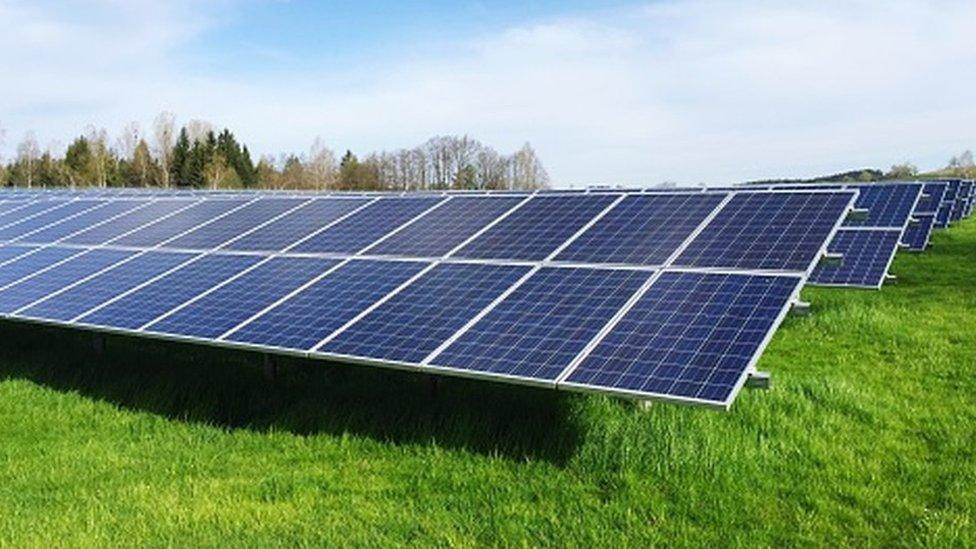Assembly election: Power questions over renewable energy
- Published
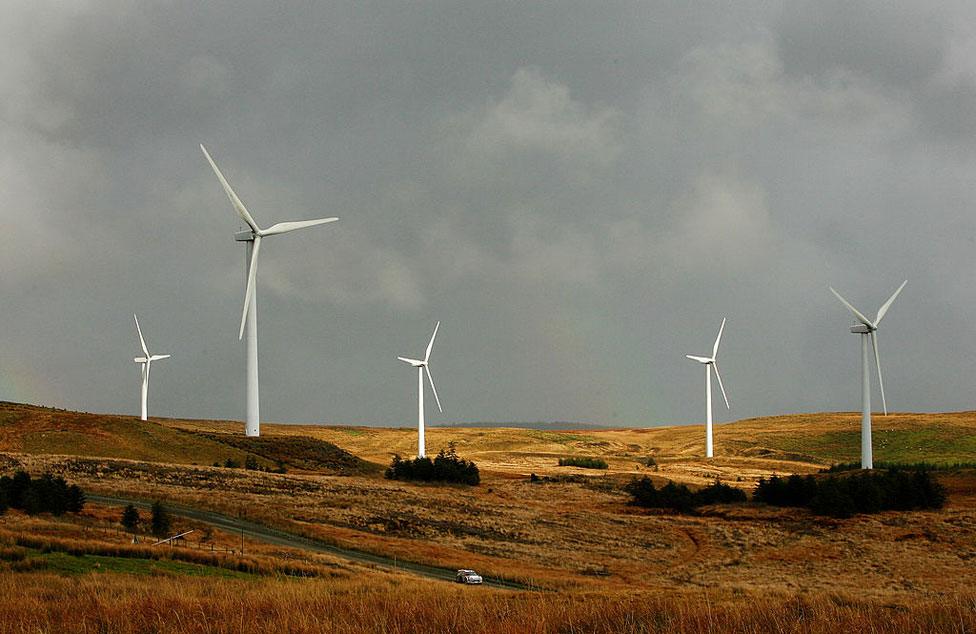
A wind farm in Ceredigion
How we generate our electricity in Wales in future, and the role politicians in Cardiff Bay have to play in the process is one of the talking points at this election.
It's a complicated picture, with control over different aspects of the process of generating power and getting it to our homes split between the Welsh and UK governments.
One thing industry experts seem to agree on though is that energy policy will be a bigger issue for whoever's in power in the Senedd after polling day than it's ever been before.
So much so that one industry body, RenewableUK Cymru, is calling for an energy minister for Wales to be appointed.
Under plans drawn up in the draft Wales Bill, planning decisions on larger energy schemes are set to be devolved from Westminster to Cardiff.
Currently, the Welsh Government looks after developments up to 50 MW. That will increase to 350 MW.
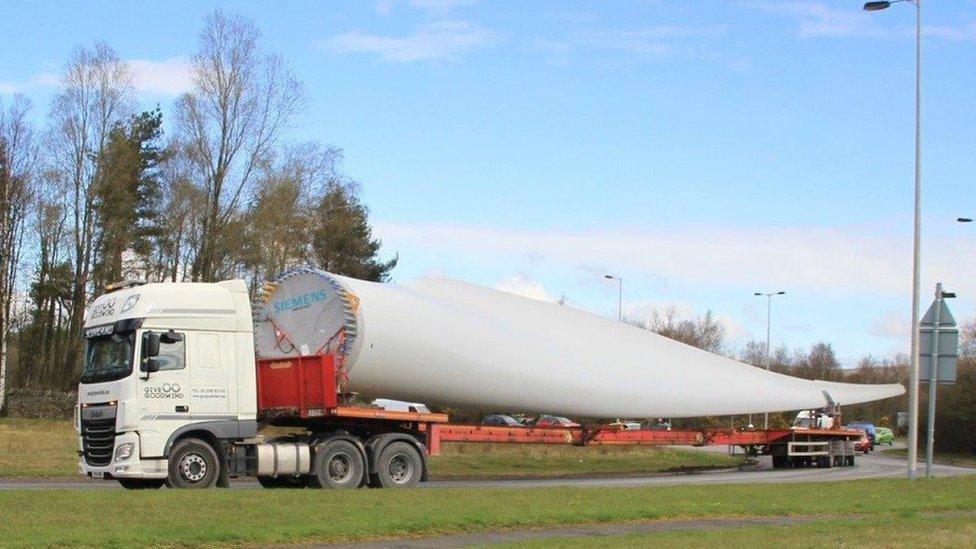
A blade for one of the 76 wind turbines destined for Vattenfall's Pen y Cymoedd energy project
To give you a sense of scale, the largest onshore wind farm in England and Wales being built at Pen y Cymoedd - between Neath Port Talbot and Rhondda Cynon Taff - will have a generating capacity of 228 MW; the proposed tidal lagoon in Swansea Bay would be 320 MW.
A new nuclear power plant at Wylfa Newydd on Anglesey comes in at 2,700 MW, so planning consent for that would remain with the UK Government.
In reality then, and for the time being, it's larger renewables schemes that the next Welsh Government could have more control over.
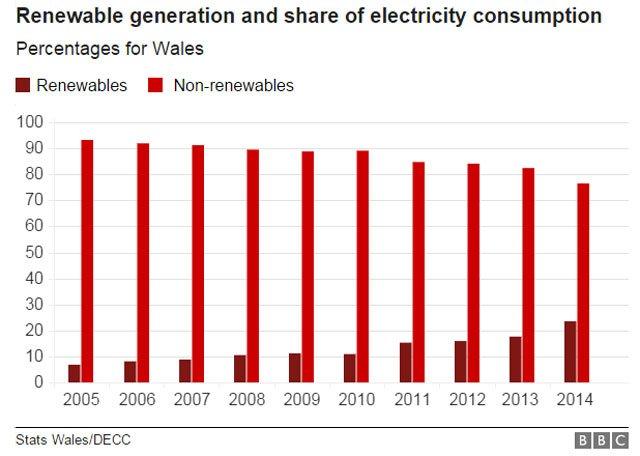
Latest figures show Wales generated around 20% of its electricity from renewables in 2014.
The Liberal Democrats say they want to see renewable sources account for 100% of Wales's electricity needs by 2025, the Green Party by 2030 and Plaid Cymru by 2035.
David Clubb, of Renewable UK Cymru is encouraged by what he's heard from parties so far
David Clubb, of Renewable UK Cymru, said: "We'd like to see targets for renewable energy in Wales - not just for the targets themselves - but because renewables are a good way to get energy bills down in the long run, a good way to create employment across Wales."
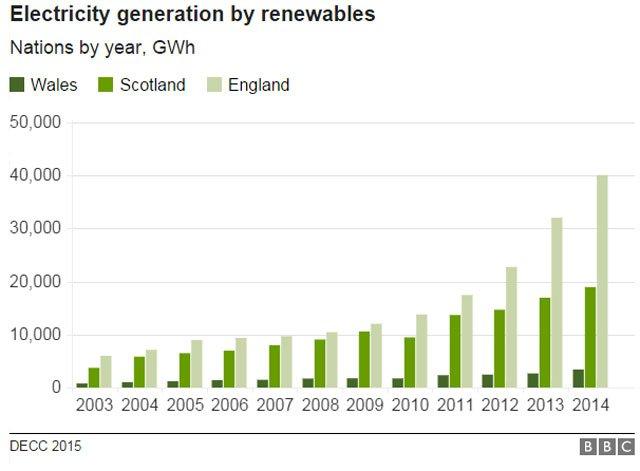
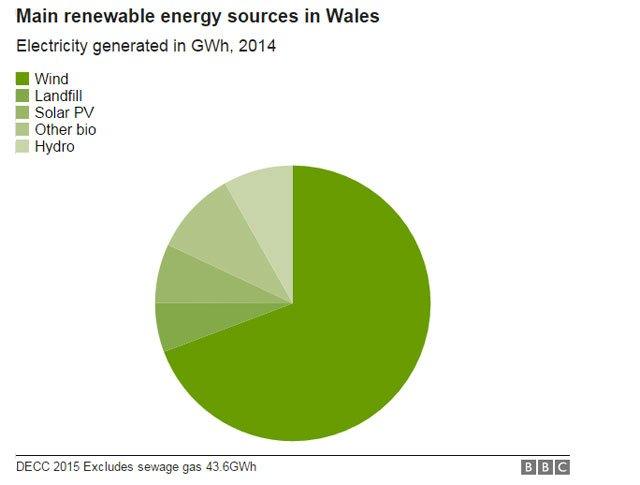
He believes reaching such a target would be achievable with the right levels of political support, and would be one way of creating jobs across Wales.
"We know that Scotland has gone very, very far in that direction and almost certainly by 2020 they'll be generating the equivalent of all their electricity from renewable sources," he said.
Keith Jones explains how a hydro project can help but there are limitations
But the bureaucracy involved in getting new schemes off the ground is a challenge, according to Keith Jones who runs several community energy projects in north Wales.
I met him at the foot of the Carneddau Mountains, where "four years of stress" have culminated in a new hydro energy project in the Anafon valley above Abergwyngregyn.
The electricity produced, enough to power 285 homes, is sold to the National Grid with the income used to support the local community.
"Ambition and implementation are two separate things in Wales," Mr Jones explained.
"Yes the Welsh Government is finally getting control over the management of sites, but the thing that distributes the energy - the grid infrastructure - and the support mechanism or subsidies are controlled through London."
"It's very, very complex - this small hydro alone was years in the making. An awful lot of stuff needs to come together for us to deliver on the ambition and resources that Wales has."
Mairede Thomas, chair of the Anglesey branch of the Campaign for the Protection of Rural Wales said there were some quite clear distinctions around renewable energy emerging from the parties, especially in terms of the extent to which local people have a say in planning decisions.
'Optimistic'
Several large wind farm developments on the island as well as proposals to construct the UK's largest solar park here have proved controversial.
"Obviously large turbines have an impact on the landscape and that's very important on Anglesey because we have a very vibrant tourism economy - it's the island's biggest employer," she said.
"Local people know their area best and they know what's needed in terms of maintaining a sustainable industry in their locality. While my heart says it would be lovely to have all our electricity produced from renewables - I think it's a little optimistic."
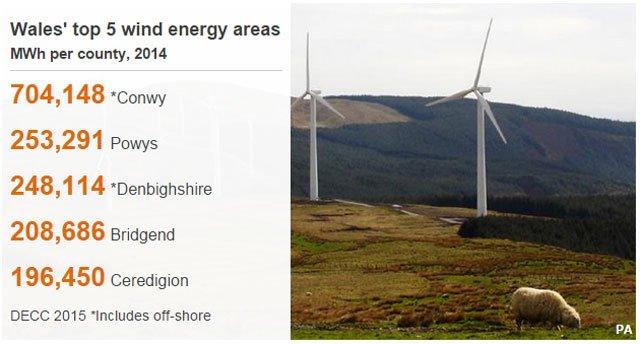
Manifesto headlines
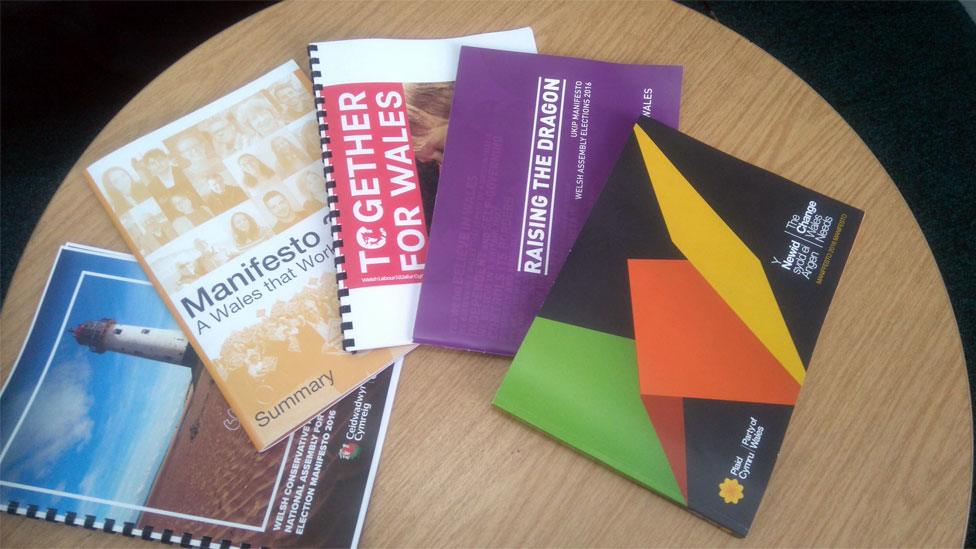
Labour , externalsays it will seek to develop more renewable energy projects, including support for tidal lagoons. It said it would support best practice to protect biodiversity in the natural environment. The party's "robust and unequivocal opposition" to fracking will continue.
The Conservatives, external would scrap planning guidance which promotes over-dependence on wind farms and encourage a variety of renewable energy production; annual reviews of carbon emissions in Wales to enable better monitoring of internationally agreed targets.
The Lib Dems, external are committed to net-zero emissions by 2050 and to produce all electricity from renewable sources by 2025. Micro-generation projects would get a presumption in favour of development; support solar and tidal power and aim for a greater focus on offshore wind. The party also rejects new fossil fuel power plants and wants a frack-free Wales.
Plaid Cymru, external pledges to produce all electricity from renewable sources by 2035; a nationwide network of smarter local grids that prioritise the use of renewable energy, as in Germany, Denmark and the Netherlands; an inventory of green energy potential - an "energy atlas of Wales; a national energy company - Ynni Cymru - a not-for-dividend company at arms-length from Welsh Government; a ban on fracking and opposition to new opencast mining.
The Greens , external would produce all electricity from renewable sources by 2030, ban fracking, back local and small-scale renewable energy projects, require councils to implement community energy strategies, invest in the national grid so it is fit for the future; make Wales a leader in tackling climate change - raising the emissions targets and setting out infrastructure projects to meet these targets.
UKIP, external would oppose unsightly wind farms and questions spending uplift on climate change projects in light of other demands. It would reallocate up to £10m to finance maintenance of the Severn bridges after the abolition of the tolls. It would freeze rail fares across Wales for first two years of next franchise and cut fares by 10% on lines where electrification has been delayed
Health, education and the economy may be dominating the election campaign so far.
But with new powers looming alongside statutory targets to cut carbon emissions 40% by 2020, it seems the next Welsh Government will also have to think long and hard about its energy policy too.
- Published25 February 2016
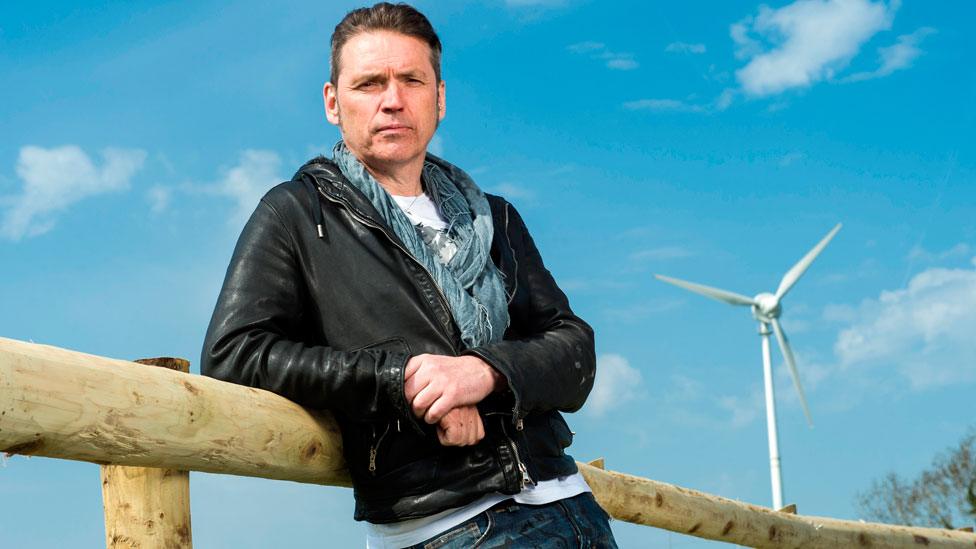
- Published18 March 2016
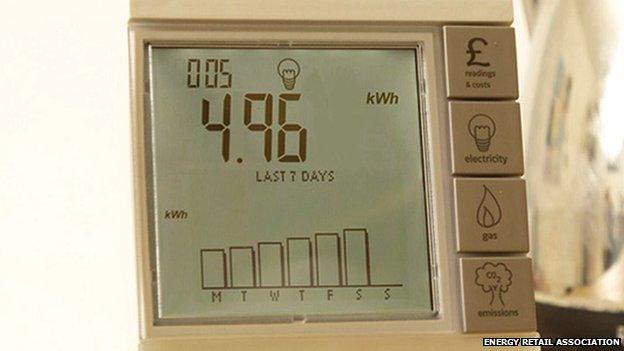
- Published3 February 2016
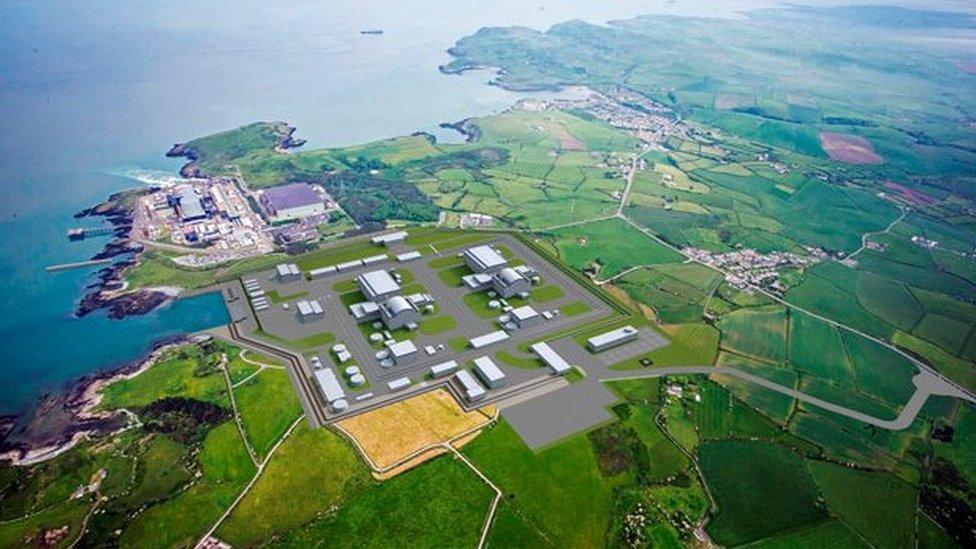
- Published26 February 2016
